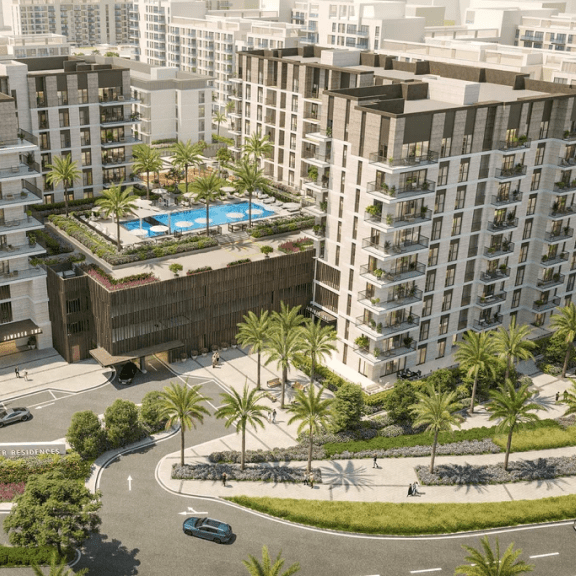Many wealthy Indians wonder if they can buy property in Dubai from India. The question is reasonable since there are restrictions on transactions involving foreigners while, at the same time, investing into Emirati houses and flats looks attractive. The short answer to whether Indians can buy property in Dubai is yes. The UAE does not establish any special prohibitions for Indian citizens.
There will be no problems with national legislation, either. The Indian Foreign Exchange Management Act, 1999 (FEMA) provides citizens of the country the right to carry out such transactions. Practice is also on their side. For instance, at the end of 2022, according to a report by Allsopp & Allsopp, among all foreign participants in the UAE market, Indians ranked second, totalling 11.9%. They were second only to the British, although they were far ahead of the French and Russians.
However, transactions with foreign participation in the Emirates still have restrictions. Here is what you need to know about buying real estate in Dubai from India, what opportunities there are, and what you should pay particular attention to.
- What Are the Advantages of Buying Real Estate in Dubai
- What Ownership Rights Are Available for Indians
- How Can an Indian Buy Property in the UAE
- What Precautions Do I Need to Take When Buying Off-Plan Properties
- What Precautions Do I Need to Take When Buying Ready-Made Properties
- How to Conclude the Deal Correctly
- How Much Does an Indian Need to Pay When Buying Real Estate
What Are the Advantages of Buying Real Estate in Dubai
British, Indian, French, Russian and many other wealthy nationals prefer the Dubai real estate market due to the stable economic and political environment. Besides that, according to Statista Market Insights, the UAE housing market demonstrates steady growth. Forecasters believe that this trend is to continue until at least 2028. This means that investing in it is a promising enterprise.
Other data also convince the buyers. For instance, the World Bank reports that the Emirates economy grew by 5.9% in 2022 compared to 2021, mainly due to the expansion of the non-oil sector. In 2023, the economy also increased, although to a more moderate extent – by only 4.1%. This did not happen because of internal problems but because of global ones with a worldwide economic recession.
2023 has been fundamentally a significant year for the sector. After all, this year, the Director General of the Dubai Land Department, Sultan Butti bin Mejren, announced a strategic plan for his department covering the period until 2026. Local authorities have developed a road map to transform the city into one of the best real estate markets in the world. Measures to carry out this program include promoting innovation and using the latest technologies to develop new solutions.
New buildings in the UAE
What Ownership Rights Are Available for Indians
Foreigners can own property in Dubai under the following conditions:
- Absolute ownership (freehold). The holder of this right and their family have the right to dispose of the property at their own discretion. An Indian can buy a house, flat or office either with their own or borrowed money – local banks willingly issue mortgage loans to foreigners. However, not all properties will be available to people interested in transactions. In Dubai, foreigners can acquire ownership of real estate only in certain territories listed in Resolution No. 3 of 2006. These areas are called freehold zones. Examples include Dubai Hills Estate, Dubai Marina, Palm Jumeirah, International City and Dubai Silicon Oasis. At the same time, there are areas where freeholding for foreigners is prohibited. For instance, they can receive housing for use under a lease or usufruct basis (more on this below) in those areas.
- Renting is almost the same as owning, except ownership rights are limited in time, with a maximum of 99 years. In addition, the tenant has no rights to the land plot: as in the case of freehold, foreigners are allowed to enter into such agreements only in certain areas established by the Dubai government.
- Usufruct is a property right that allows the owner of real estate to use and exploit it at their discretion under one condition: the property shall remain in the initial condition with an account of natural wear and tear. The UAE Civil Code determines the key features of this type of relationship, according to which the standard term of usufruct is 50 years. After this, the contract is terminated unless the parties agree otherwise.
In all cases, all title rights are registered with the Dubai Land Department (DLD).
Dubai. Photo: Aleksandar Pasaric (Pexels)
How Can an Indian Buy Property in the UAE
Purchasing real estate has certain peculiarities for Indians. For one, they must settle several formalities in the UAE and their home country. For instance, in Dubai, in many cases, they will need to get approval from the Land Department (DLD), while in India, they will need to report the completed transaction to local authorities.
According to DLD guidelines, when purchasing a property, the buyer should carefully check the seller and the developer. To make it easier, the UAE government has created all the conditions. The stages of such an audit will be slightly different for off-plan real estate and commissioned properties.
What Precautions Do I Need to Take When Buying Off-Plan Properties
Before proceeding with the transaction, if the buyer wants to check the developer, they must visit DLD and the Real Estate Regulatory Agency (RERA) in person or the Dubai Land Department website.
There, you need to get answers to the following questions:
- Is the project and the developer registered with RERA?
- Does the project have an escrow account? What is the account agent's name and number? This refers to the escrow account in which money is reserved before the facility is put into operation. This protects the buyer from unforeseen situations. The seller will receive the payment only after the construction is completed. If the completion deadline is not met, the project will be transferred to another developer, or the buyer will get their money back. So, a foreigner would only risk losing time and minor finances due to their depreciation at the inflation rate.
- What is the completion rate? How long is it going to be before the construction is completed?
- Does the developer have permission from DLD and RERA to sell specific units?
Positive answers to these questions indicate the maximum security of the transaction. This is reliable protection against fraud.
What Precautions Do I Need to Take When Buying Ready-Made Properties
When purchasing a ready-made property, the risks are lower because the property already exists physically. This means that you can inspect it to examine all the characteristics personally. However, in addition to an audit of operational properties, consider conducting a legal examination of the transaction. To do this, you will need:
- To ask the seller to provide information about the property. To do this, the seller must contact DLD on their own or with you, or you contact DLD by proxy. Data will not be provided without the owner's consent.
- The Dubai Land Department must ensure that the property being sold belongs to the seller and that no limitations exist, such as mortgages.
How to Conclude the Deal Correctly
In Dubai, all sales contracts have a standard (unified) form – Form F. This document is strict regarding mandatory conditions that cannot be changed, but you can add your conditions provided they do not contradict the law. Many real estate consultants recommend using this opportunity.
The UAE has the Dubai REST smart platform. It is available to property owners, real estate brokers, developers, appraisers, investors, and all market beneficiaries. Using this service, you can agree with the account of the legal requirements and your own needs.
The buyer must also obtain a No Objection Certificate (NOC). It confirms that the seller has paid all the expenses for maintaining the property and that no other violations could affect the legality of the transaction. The fee for obtaining the certificate is 500 AED (11,320 rupees or $136).
To facilitate all procedures, Indians can use the services of a broker. To do this, they must visit the DLD website's Brokers section and find a licensed intermediary there. You must then sign the Land Department's standard broker appointment form. Their services are necessary for legal, due diligence, document preparation and deposit guarantees. The fact is that when drawing up a purchase and sale agreement, the buyer usually pays the seller 10% of the total value of the property as a guarantee that the transaction will take place. As a rule, the parties agree that if one refuses the preliminary agreements, the other party shall receive compensation. The broker controls the transaction and stores the document that confirms it.
A contract needs to be registered within 60 days. At least, that is the term for developers. They face a fine for violating this rule. As for other cases, there is no information about the filing time with DLD. But you should not delay this visit because the buyer cannot acquire ownership rights without registration.
The Land Department operates through trusted offices. The registrar verifies the documents and enters the data into the system linked to the DLD. After receiving approval, the buyer is issued a certificate of ownership. The seller's participation at this stage is also mandatory. They may act personally or through a representative. All documents in a foreign language must have a certified translation into Arabic.
Dubai. Photo: jeshoots.com (Pexels)
How Much Does an Indian Need to Pay When Buying Real Estate
When deciding to buy property in Dubai, an Indian needs to bear in mind that there are fees that come with the purchase. Their size depends on the type of property (completed or off-plan), the participation of a broker in the transaction, whether or not they take out a mortgage, and so on. In any case, the following fees are mandatory:
- For the transfer of property in the Dubai Land Department, it is 4% of the property's value. There is also a fixed administration fee of 580 AED (13,132 rupees or $158).
- Registration fees range from 2,000 AED (45,281 rupees or $545) to 4,000 AED (90,562 rupees or $1,089). The specific payment amount depends on the price of the property.
- The fee for obtaining a title deed is 250 AED (5,660 rupees or $68).
This does not include agency fees, appraiser fees, fees for the mortgage agreement and its registration. All of these fees are additional and may not apply in all cases.
In a Nutshell
“Can we buy property in Dubai?” is a question many Indians ask. The short answer is always a yes since neither Emirati nor Indian national legislation contains restrictions. Still, such transactions have particular nuances.
In particular, Indians need to understand that full ownership, the so-called freehold, is only available when purchasing real estate in certain zones established by the UAE government. This also applies to long-term leases for up to 99 years. There are slightly more possibilities for usufruct – limited ownership for up to 50 years. Such transactions allow the use of property without the right to change it.
Buying real estate is a strictly regulated process in the UAE. The procedure is simple and accessible and involves registering transactions with the Dubai Land Department (DLD). However, buyers should consider hiring specially licensed brokers to complete the transaction to avoid risks.
Cover photo: Pavlo Luchkovski (Pexels)




